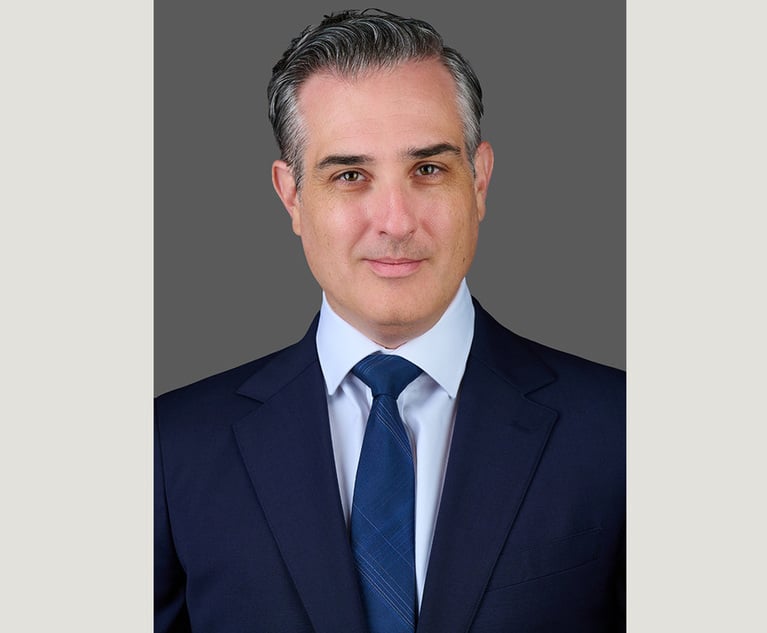 Photo credit: Ralph Coulter/iStockphoto.com
Photo credit: Ralph Coulter/iStockphoto.comJudge Explains How to Bring Discrimination Lawsuit Against Non-Employer Supervisor
U.S. District Judge Mark Kearney of the Eastern District of Pennsylvania granted defendant Jonathan Lowe's motion to dismiss but also granted leave for plaintiff John Fleet to amend his complaint.
December 22, 2017 at 08:53 AM
3 minute read
Despite being an allegedly “central character” in a racial and disability discrimination suit, a CSX supervisor has been let out of the case—at least for now—because he was not the plaintiff's employer. But in dismissing the case without prejudice, a federal judge has laid out a road map for employees bringing discrimination claims against non-employer supervisors.
U.S. District Judge Mark Kearney of the Eastern District of Pennsylvania granted defendant Jonathan Lowe's motion to dismiss but also granted leave for plaintiff John Fleet to amend his complaint to allege that Lowe was directly involved in his purported discriminatory firing.
Fleet, who is black, claimed he was fired from his job as a railworker because of his race and his diabetes, a condition that caused him to take frequent meal breaks to keep his blood sugar in check. He also required frequent trips to the bathroom.
Fleet alleged that CSX employees began to murmur about others taking too many breaks, creating tension in the workplace. He also claimed he was reprimanded for eating a sandwich during a meeting. Fleet further alleged a supervisor, Ryan Gomez, followed him at work to monitor his activity. Lastly, after confronting an employee about comments made about his breaks, Fleet was told by Lowe to go home early on Dec. 31, 2016, according to Kearney's opinion.
Charges of insubordination and dereliction of duty were ultimately brought against Fleet, and he was subsequently fired in March. Pending charges meant he was not allowed to work since being sent home in December. Fleet sued CSX, and Gomez and Lowe in their individual capacities. Specifically, he claimed Lowe sending him home early constituted discrimination.
“When the supervisors are not his employer, the worker must show the supervisor's personal involvement in the alleged misconduct adversely affected the worker's conditions of employment or otherwise dissuaded proper reporting of the alleged misconduct,” Kearney reasoned in his opinion.
Kearney continued that where, as in Fleet's case, a worker alleges a supervisor was liable for discrimination based on a decision to send the worker home early one day but includes very little in his pleadings, alleging the supervisor played a direct role in his termination, ”we must dismiss the supervisor from the case even if he is described in briefing as a 'central character' unless, with one last chance to amend, the worker can plead facts of personal involvement in good faith.”
Kearney dismissed Fleet's Title VII and Pennsylvania Human Relations Act claims against Lowe with prejudice, noting that Lowe could not be held individually liable under the statute.
Thomas R. Chiavetta of Jones Day in Washington, D.C., represents the defendants and declined to comment on the decision. Fleet's attorney, Samuel C. Wilson of Derek Smith Law Group in Philadelphia, did not respond to a request for comment.
This content has been archived. It is available through our partners, LexisNexis® and Bloomberg Law.
To view this content, please continue to their sites.
Not a Lexis Subscriber?
Subscribe Now
Not a Bloomberg Law Subscriber?
Subscribe Now
NOT FOR REPRINT
© 2025 ALM Global, LLC, All Rights Reserved. Request academic re-use from www.copyright.com. All other uses, submit a request to [email protected]. For more information visit Asset & Logo Licensing.
You Might Like
View All

'Taking the Best' of Both Firms, Ballard Spahr and Lane Powell Officially Merge
6 minute read

Trending Stories
- 1New York Court of Appeals Blocks Trump Attempt to Stay Friday Sentencing
- 2'Self-Diagnosed Nickel Allergy' Fails to Find Success in Med-Mal Suit, 8th Circuit Rules
- 3Eversheds Sutherland Adds Hunton Andrews Energy Lawyer With Cross-Border Experience
- 4Balancing Judicial Authority: Understanding Sanctions, Severance, and Interferences
- 5Up in the Air: Boeing’s Deferred Prosecution Saga Continues
Who Got The Work
Michael G. Bongiorno, Andrew Scott Dulberg and Elizabeth E. Driscoll from Wilmer Cutler Pickering Hale and Dorr have stepped in to represent Symbotic Inc., an A.I.-enabled technology platform that focuses on increasing supply chain efficiency, and other defendants in a pending shareholder derivative lawsuit. The case, filed Oct. 2 in Massachusetts District Court by the Brown Law Firm on behalf of Stephen Austen, accuses certain officers and directors of misleading investors in regard to Symbotic's potential for margin growth by failing to disclose that the company was not equipped to timely deploy its systems or manage expenses through project delays. The case, assigned to U.S. District Judge Nathaniel M. Gorton, is 1:24-cv-12522, Austen v. Cohen et al.
Who Got The Work
Edmund Polubinski and Marie Killmond of Davis Polk & Wardwell have entered appearances for data platform software development company MongoDB and other defendants in a pending shareholder derivative lawsuit. The action, filed Oct. 7 in New York Southern District Court by the Brown Law Firm, accuses the company's directors and/or officers of falsely expressing confidence in the company’s restructuring of its sales incentive plan and downplaying the severity of decreases in its upfront commitments. The case is 1:24-cv-07594, Roy v. Ittycheria et al.
Who Got The Work
Amy O. Bruchs and Kurt F. Ellison of Michael Best & Friedrich have entered appearances for Epic Systems Corp. in a pending employment discrimination lawsuit. The suit was filed Sept. 7 in Wisconsin Western District Court by Levine Eisberner LLC and Siri & Glimstad on behalf of a project manager who claims that he was wrongfully terminated after applying for a religious exemption to the defendant's COVID-19 vaccine mandate. The case, assigned to U.S. Magistrate Judge Anita Marie Boor, is 3:24-cv-00630, Secker, Nathan v. Epic Systems Corporation.
Who Got The Work
David X. Sullivan, Thomas J. Finn and Gregory A. Hall from McCarter & English have entered appearances for Sunrun Installation Services in a pending civil rights lawsuit. The complaint was filed Sept. 4 in Connecticut District Court by attorney Robert M. Berke on behalf of former employee George Edward Steins, who was arrested and charged with employing an unregistered home improvement salesperson. The complaint alleges that had Sunrun informed the Connecticut Department of Consumer Protection that the plaintiff's employment had ended in 2017 and that he no longer held Sunrun's home improvement contractor license, he would not have been hit with charges, which were dismissed in May 2024. The case, assigned to U.S. District Judge Jeffrey A. Meyer, is 3:24-cv-01423, Steins v. Sunrun, Inc. et al.
Who Got The Work
Greenberg Traurig shareholder Joshua L. Raskin has entered an appearance for boohoo.com UK Ltd. in a pending patent infringement lawsuit. The suit, filed Sept. 3 in Texas Eastern District Court by Rozier Hardt McDonough on behalf of Alto Dynamics, asserts five patents related to an online shopping platform. The case, assigned to U.S. District Judge Rodney Gilstrap, is 2:24-cv-00719, Alto Dynamics, LLC v. boohoo.com UK Limited.
Featured Firms
Law Offices of Gary Martin Hays & Associates, P.C.
(470) 294-1674
Law Offices of Mark E. Salomone
(857) 444-6468
Smith & Hassler
(713) 739-1250





